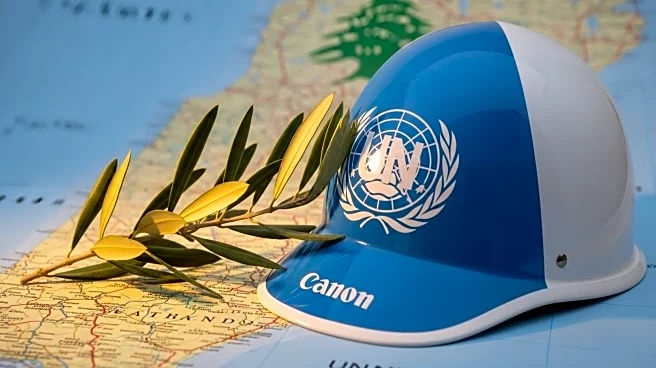What is the story about?
What's Happening?
The United Nations Security Council has decided to end the United Nations Interim Force in Lebanon (UNIFIL) by 2027, concluding nearly five decades of peacekeeping operations along Israel's northern border. The resolution, supported by the United States and Israel, extends UNIFIL's mandate until the end of 2026, after which a year-long withdrawal process will commence. UNIFIL was established in 1978 following Israel's Litani Operation and has been tasked with monitoring violations along the 'Blue Line,' the UN-demarcated border. Despite its efforts, Israel has criticized the force for allowing Hezbollah to build a significant military presence in southern Lebanon.
Why It's Important?
The termination of UNIFIL's mandate marks a pivotal moment in the security dynamics of southern Lebanon. The peacekeeping force has been a stabilizing presence, helping to prevent escalations between Israel and Hezbollah. Its withdrawal could lead to increased instability if the Lebanese army is unable to manage the region effectively. The decision reflects broader geopolitical shifts, including the Trump administration's push to reduce U.S. funding for international peacekeeping operations. European nations, particularly France and Italy, have expressed concerns that a premature withdrawal could empower Hezbollah, potentially leading to renewed conflict in the region.
What's Next?
As UNIFIL prepares for its withdrawal, the Lebanese government faces the challenge of assuming full security control in the south. Beirut is promoting a 'historic initiative' to disarm Hezbollah, though the group has rejected the plan, warning of potential civil unrest. The international community is urged to support Lebanon's armed forces with equipment, material, and financial aid to ensure a smooth transition. The resolution calls for Israel to withdraw its forces from north of the Blue Line, although this remains a contentious issue.
Beyond the Headlines
The decision to end UNIFIL's mandate raises questions about the future of peacekeeping operations in volatile regions. It highlights the complexities of balancing international intervention with national sovereignty and the risks of leaving security responsibilities to local forces that may be ill-equipped to handle them. The move also underscores the influence of major powers like the U.S. and Israel in shaping U.N. policies, potentially at the expense of regional stability.
















